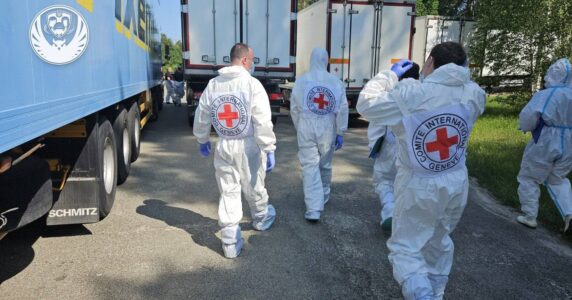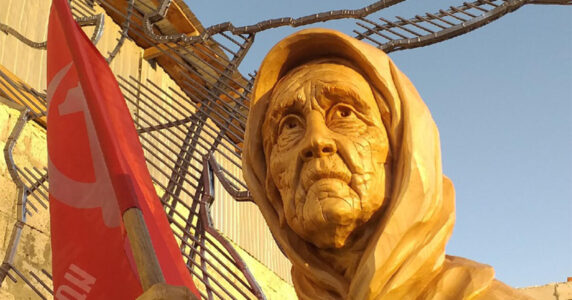Navigation and useful materials
After Russia grossly violated its international obligations to recognize the territorial integrity of Ukraine and refrain from aggression, in particular, within the framework of the Budapest Memorandum, its other signatories responded to the call for help to give us a chance to exercise our right to self-defence.
The United States and the United Kingdom have shown leadership and helped assemble a coalition of fifty countries that are helping Ukraine. It includes almost all European countries. Russia’s neighbours, understanding its criminal neocolonial ambitions like no other, have acted as defenders and lobbyists of Ukraine, countering the frenzied Russian propaganda.
The support of Ukraine by sustainable democracy countries presented the Kremlin’s accusations of “Nazism” as ridiculous because it turned out that the whole democratic world was Nazi. However, exposing Russian lies has never stopped Moscow. Therefore, to repel a larger army, which had been preparing for this war for decades, Ukraine needed effective international assistance in various fields, first of all, the supply of weapons and ammunition.
In this article, the Centre for Strategic Communication and Information Security recalls what assistance its allies provided to Ukraine in 2023, and what it saved our country from.
Goals for 2023
Ukraine, which suffered from terrorist attacks on the energy infrastructure, started the second year of repelling the full-scale aggression with comforting news. It was primarily about receiving two American Patriot SAM systems. The transfer of this rather high-tech air defence system after months of hesitation by the United States showed that Ukraine was trusted. Serious preparatory work was carried out for the effective use of the complexes.
Moreover, in January, the forthcoming transfer of Leopard tanks to Ukraine, necessary for the long-awaited counteroffensive, was announced.
READ ALSO: From Portable Weapons to Leopard Tanks: 7 Stages of Western Assistance to Ukraine
Since the beginning of the full-scale invasion, Western weapons have had a significant impact on the course of hostilities. However, no type of weapon alone could provide a strategic advantage. Despite this, in the mass consciousness, getting a new iconic weapon is always perceived with a certain euphoria and hope for miraculous equipment. We can remember how before the full-scale aggression, Javelin, Stinger, and Bayraktar were idealized in society. This trend was even reflected in the ironic meme “Saint Javelin.”
In the subsequent stages, the breakthroughs that influenced the course of the war were the American howitzers M777, as well as the MLRS HIMARS. The latter also became subjects of endless memes.
But it is obvious that strategically, victory will be ensured by the combination of all elements. One of them is the general consistency and disposition of the people to regularly overcome complex challenges.
At the end of 2022, Commander-in-Chief Valerii Zaluzhnyi said in an interview that he needed “300 tanks, 600–700 infantry fighting vehicles, 500 howitzers” for the counteroffensive. Thus, the task for 2023, in addition to strengthening the air defence, was the formation of a mechanized “iron fist” to break through the line of defence of the ruscists. In 2023, the allies are helping us to form it. In spring, we received Leopard tanks and other armoured vehicles: Swedish CV 90 IFVs, American Bradleys, MaxxPro armoured vehicles, etc.
The combat vehicles were not prepared for a parade. As Zaluzhnyi later noted, commenting in an interview with The Washington Post on June 30 on the inevitable losses of the counteroffensive, “a Leopard tank is a target on the battlefield.”
Western partners helped to compensate for the lost equipment. According to military historian Mykhailo Zhyrokhov, instead of the lost 17 Bradleys, we were given 15. Portugal, for example, announced that it would provide 4 more Leopard tanks.
What was saved by Patriot and how to close the sky
In 2023, the emphasis was on strengthening air defence. In spring, Patriot began to cover the Ukrainian sky, in particular, over the capital. In addition, the Ukrainian air defence system was strengthened by the SAMP/T complex from Italy and France, the Avenger self-propelled surface-to-air missile system, and the Gepard anti-aircraft self-propelled guns. This new air defence umbrella actually saved the capital during an increase in the wave of shelling in May, when the Russians attacked Kyiv and Kyiv Oblast 17 times.
“During such attacks as in May, we could have been left with the ruins of administrative buildings in the centre of Kyiv and several affected important strategic facilities,” says Mykhailo Zhyrokhov. “In May, the Russians began to massively use Kinzhal aero-ballistic missiles, which we wouldn’t have intercepted with anything but Patriot. At least 13 Kinzhal missiles could have reached their targets. Then we would see, for example, the ruins of the SSU, the General Staff, and maybe the building of the Verkhovna Rada, Bankova. There are also alternate command centres, which are underground and covered with concrete. It was for their destruction that the Russians launched Kinzhal missiles in May. Previously, the ruscists already used these expensive missiles against the ammunition depot in Lviv Oblast. On the day of the Ukrainian Air Force in 2022, 2 missiles hit the disguised command centre of the Ukrainian Air Force. These are the cases that were mentioned in the public sphere. Maybe there were more.”
At the NATO Summit, it was reported that Germany would transfer two more launchers to the Patriot SAM.
Russia has also intensified attacks on Ukraine with Iranian Shahed UAVs. A question of the development of air defence precisely to combat kamikaze drones has arisen because this requires other tools than those used to shoot down Kinzhal or cruise missiles like Kalibr.
“For the war with the Shahed drones, it is necessary to increase the number of mobile groups.” says Zhyrokhov. “Pickup trucks with machine guns and an early warning system because radar stations do not cover them and the main method of detection is visual contact. We need more people who will look at the sky through binoculars or other technical means. If we are talking about nights — we need powerful spotlights, as during World War II.”
In 2023, to strengthen protection against UAVs, Ukraine began to receive Viktor anti-aircraft machine gun systems from the Czech Republic, which are already successfully operating in the north of Ukraine. This is a paired 14.5 mm anti-aircraft machine gun, which is mounted on the Toyota Land Cruiser 70 chassis and, in addition to the UAV, is also useful for countering aircraft and helicopters at low altitudes.
According to Mykhailo Zhyrokhov, 15 Viktor units have already been transferred to Ukraine, and hundreds more have been paid for by the Netherlands. During the recent visit of the President to the Czech Republic, it became known that the country would also provide Ukraine with attack helicopters.
Storm Shadow missiles remind about the borders of Ukraine
In addition to tanks and the strengthening of air defence, it was important for Ukraine to obtain a certain number of Storm Shadow long-range cruise missiles with a launch range of more than 250 kilometres.
The Anglo-French Storm Shadow is a long-range air-launched missile. They were provided by the United Kingdom on the condition that Ukraine would not apply them on the territory of Russia. This technological weapon, given its cost and limited number, is suitable for striking the most important enemy targets — command centres, air bases, fuel and ammunition depots, etc. In May, the destruction of Russian facilities in occupied Luhansk was reported. The building of the former Higher Military Aviation School of Navigators, which could have hosted a military base or a barracks with personnel of the Russian occupation forces, was targeted. On June 8, Storm Shadow missiles destroyed the bases for repairing ruscist equipment on the territory of industrial enterprises in Luhansk. Russian Major General Sergei Goryachev was liquidated in Ukraine in mid-June during a strike on the command centre of the occupiers.
According to the reserve officer of the AFU Andrii Kramarov, the rate of Russians intercepting Storm Shadow missiles is only 10-15%. Thus, high-precision weapons remind the occupiers throughout Ukraine that state borders exist in order to be respected.
The UK also announced that it will transfer kamikaze drones with a range of up to 200 km to Ukraine in the first months of summer.
Ukraine also expects to receive ATACMS short-range ballistic missiles for HIMARS, which have a range of 140 or 300 km.
At the NATO summit, French President Emmanuel Macron said that his country was transferring SCALP missiles to Ukraine, which is the French equivalent of Storm Shadow.
F-16 aircraft — getting started
In 2023, the Biden administration stated for the first time that F-16 aircraft could be provided to Ukraine. The discussion moved to the plane of pilot training, which showed the presence of a principled decision. However, the Pentagon believes that this year, first of all, it is necessary to focus on strengthening air defence, and not on aircraft.
Great Britain took up the training of Ukrainian crews. Thus, Minister of State for the Armed Forces James Heappey said that his country “will begin basic training for twenty Ukrainian pilots in August.” The Netherlands and Denmark are also cooperating to organize the training of Ukrainian pilots to fly fourth-generation aircraft. Recently, it has been reported that Romania plans to open an F-16 pilot training centre for NATO and Ukraine.
According to Mykhailo Zhyrokhov, F-16 aircraft will appear in Ukraine no earlier than the beginning of 2024. If the Ukrainian Air Force mentions 6 months, then the West voices much longer terms.
“The West first sets up the infrastructure, and then it provides the planes. The problem is that we do not have the appropriate airfield equipment because it is all tailored to Soviet models. There are no technicians who could service the F-16 because this is a different philosophy of weapons, which is new to us. Soviet equipment was created as simple, roughly, for anyone, and the Western one implied that it would be serviced by a motivated professional. One F-16 aircraft requires, if I am not mistaken, 12 technicians in different directions. Starting with radar equipment and ending with weapons. Technicians learn longer than pilots. You also need to learn how to use bombs and missiles correctly. In fact, training pilots is the minimum of what needs to be done.
Perhaps in the public field, the emphasis on the F-16 has the logic to keep this process in focus and moving forward. However, from a military perspective, if 24 aircraft are given to us now, they will be shot down in combat operations the day after tomorrow.”
Yurii Ihnat, the spokesman of the Air Force of Ukraine, drew attention to the fact that F-16 aircraft are needed primarily to intercept missiles that strike regions that are less covered from the sky.
Tank year of Ukraine
Assistance from the West is comprehensive, and therefore seems slow. Tanks and self-propelled artillery units were not provided until repair depots were established in Lithuania, Poland, and Romania, so that Ukraine could not only use the equipment on the battlefield, but also repair and maintain it in good condition.
According to Zhyrokhov, the technical infrastructure, developed in neighbouring allied countries, proved its effectiveness. Thus, the self-propelled Panzerhaubitze 2000 is repaired in Lithuania, Krab — in Poland. In Romania and Poland, repair workshops for Western tanks have been created, which are already operating.
In early summer, the training of Ukrainian forces on the Stryker and Bradley combat vehicles was completed, as reported by the U.S. Department of Defense. Presently, Ukrainians are undergoing training on American Abrams M1A1 tanks, which is likely to be completed by the end of the summer. It is expected that after autumn training, 31 tanks will be provided to Ukraine. There were reports that Abrams M1A1 tanks were currently being mastered by 200 Ukrainians, whose training would last 3 months.
Moreover, in early June, in the UK, Ukrainian soldiers were trained on AS 90 self-propelled howitzers and Challenger 2 tanks. In the coming months, Ukraine is to receive an additional amount of Leopard 2 and Leopard 1 tanks. At the NATO Summit in Vilnius, Germany announced the transfer of 40 Marder IFVs and 25 Leopard 1 tanks. Germany and Poland should jointly provide training and their maintenance. According to Oryx analysts, in 2023, the Czech Republic supplied Ukraine with 90 T-72 tanks, which were financed by the United States and the Netherlands.
In total, more than 60,000 Ukrainian servicemen were trained by allies and partners; 11,000 of them were trained by the United States. However, according to Mykhailo Zhyrokhov, training in Europe is not a panacea. European countries do not have much combat experience. Recently, it has been mostly about peacekeeping operations. Sometimes there are elements in training that are rarely useful in a real war. In addition, the wartime army of Ukraine consists of mobilized civilians, and therefore one should not expect that a person will master, for example, staff experience, which will be practical in Ukrainian combat conditions, in 2 months of the training. These things need to be considered in the future.
On the eve of the NATO Summit in Vilnius, the United States decided to include 155-mm DPICM cluster munitions in the new package of military assistance to Ukraine. This will help the Defence Forces avoid the “ammunition hunger” that accompanies the hostilities throughout the full-scale phase of the war.
Defense Express quotes Joseph Biden: “Unless such weapons are given to the Armed Forces, the civilian population of Ukraine that will indeed suffer, but at the hands of Russian occupiers.” This fuels optimism about the future transfer of ATACMS missiles to Ukraine. According to the latest news, Slovakia will provide Ukraine with 16 Zuzana self-propelled howitzers, and the countries will also jointly produce a new type of howitzer. According to media reports, Poland handed over about 10 Mi-24 attack helicopters to Ukraine. A 155-mm Firtina self-propelled gun is expected from Turkey.
Since the beginning of the full-scale Russian invasion, the Biden administration has allocated more than USD 41.3 bln for security assistance to Ukraine.
Interesting data was provided by Laura K. Cooper, Deputy Assistant Secretary of Defense for Russia, Ukraine, Eurasia, at a Capitol hearing about the contributions of other coalition members. According to her, more than half of all tanks, armoured personnel carriers, infantry fighting vehicles, 155-mm artillery systems and unmanned aircraft systems, as well as about half of Stinger and Javelin missiles, come to Ukraine from other allies.
If we count not in absolute numbers, but in proportion to our GDP, says Cooper, then the United States comes 12th in the ranking of countries that help Ukraine. Nine European countries have already provided more than USD 1 billion.
Ms. Cooper noted another important point: allies are beginning to make long-term commitments to support Ukraine. Thus, Germany approved a support programme worth about USD 13 bln over the next 9–10 years. Norway has allocated more than USD 7 bln, and Denmark recently announced assistance for USD 3.2 bln. In cooperation with partners, the industrial production of weapons is growing both to support Ukraine and to replenish the Ministry of Defence, she said.
Another fact was reported to the International Donor Coordination Centre. To date, Ukraine has received about 600 different types of equipment and armed platforms. According to one of the Centre’s representatives, the fact that the Defence Forces were able to skilfully manage and maintain these systems is a testament to Ukrainian skill and ingenuity. After all, such diversity is unprecedented for one country.
The training of the Ukrainian military takes place at about 40 training grounds outside Ukraine.
A large number of countries that help Ukraine realize that the final say in the war for freedom will be given to Ukrainian soldiers who heroically destroy the aggressor and liberate their land.
The democratic world is showing integrity in defending justice and international law, as well as the principles that were laid down in the Budapest Memorandum when Kyiv agreed to nuclear disarmament. Ukraine highly appreciates this assistance. Overcoming common challenges for the sake of defeating the evil also helps unite the countries of the free world on a new level, which will give rise to new strong partnerships, interaction, and prosperity.
Centre for Strategic Communication and Information Security
If you have found a spelling error, please, notify us by selecting that text and pressing Ctrl+Enter.


